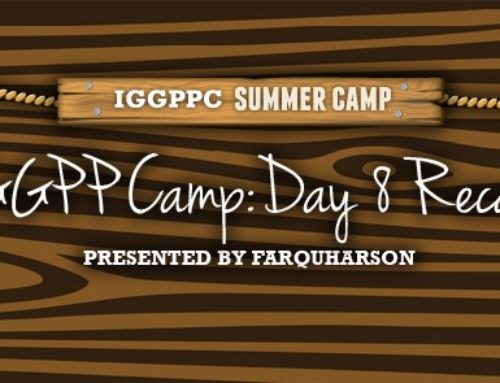Back in the “glory days” of my senior year in high school (the only glory days a 22 year-old knows of at this point), I was involved in a program called the CAPPIES. What we did is we travelled to other high schools in our area and we were given prime seats to watch those schools’ plays and musicals. We would write reviews for those productions and then 3 would be selected to be published in the local newspapers.
I ended up winning 1 of the 2 awards handed out for Top Critic because of the number of plays I went to see and the number of reviews I had published. After high school was done I kept the binder of review guidelines that all CAPPIES were given, which details the 7 paragraph rule for writing reviews that I lived by during my times as a play critic. I’ve found that this rule can be applied to writing reviews for almost all types of media, from movies to books to TV shows and more. I’ve made a few minor adjustments to the formula to share with you guys today 🙂
*First, let me say right off the bat that these steps are merely guidelines, and you don’t have to stick to them religiously in order to write a publication-worthy review. As you get more comfortable with writing reviews you’ll naturally be able to develop your own style and format. This is just one way to write reviews, and it’s not a bad jumping off point.
** This formula was not created by me. I’m working from the Seven Paragraph Plan in the 2009-10 CAPPIES binder by Jason Kobieuls. I have done my best to paraphrase his original work and amend the rules to apply to mediums aside from live theatre.
Paragraph #1: The Lead
There are two types of effective leads: The Zinger is a catchy, one-sentence grabber that plays off the production or content of what it is you’re reviewing. And the dramatic describer, where you may choose a captivating or definitive moment to write about in order to grab the attention of your audience.
Both of these leads are designed to grab the eye of the reader. Whichever method you choose, make sure that it is clear and concise.
Paragraph #2: The Story
When I was reviewing musicals and plays, before I would try to give a summary of the production’s plot, I would first give some information about the history of the production. Tidbits such as when the play was written, any awards it may have won and how long it ran on Broadway were things inserted at the beginning of this paragraph.
It never hurts to discuss any applicable history of the work you’re reviewing. Was the work adapted from something (a book, play or previously released movie/TV show)? Have the writer(s)/creator(s) of the work you’re reviewing released any other notable works? It might be a good idea to make note of any directors/writers/composers/lyricists here if that’s something you feel is important to mention.
Part of this paragraph is a short synopsis of the work you’re reviewing. The best way to do this is to write two or three well-crafted sentences that cover the major plot elements, and only the major plot elements. Bring up the main character(s), key settings/time frames as well as what happened in the plot. You can keep your audience interested by ending this paragraph with a cliff-hanger, or you can mention major feelings presented in this work.
Paragraph #3: Overall Production
Here is where some broad observations can be made. You could mention a specific element that anchored the plot, an inventive or unusual concept, an actor’s/character’s/writer’s energy, etc. Two or three very considered sentences will work here, but only if you enjoyed the work/considered it a success.
If you felt the work you’re reviewing fell short in areas, describe it without praising it too much. Editors and even readers will see right through great proclamations if the work wasn’t very successful. Don’t mention any major problems here.
Paragraph #4: The Leads
Time to dedicate some space to the main characters/actors. I suggest taking one of three paths here:
- Mention each lead separately (if there are more than one).
- Combine mentions (if in your opinion they were of equal importance/worth).
- Don’t mention them at all. If you feel you should criticize the leads – and if they seemed lacking in any way, you should – it’s best not to do it here, where it would be obvious who you’re criticizing. Do this later, where you can state it in a more indirect manner.
*Remember not just to say something was good. Say how and why it was good.
Paragraph #5: Supporting and Ensemble
Now it’s time to mention that supporting actor/character/dancer/vocalist/guest star you haven’t gotten the chance to mention yet. Here is where you have the most freedom concerning your ability to write about specific elements in the work you enjoyed. Criticisms about most aspects of your selected work – the ensemble, minor characters, and leads – are appropriate here.
*Do not hesitate to criticize (when warranted)! However, you should justify all criticisms with specific and persuasive examples.
Paragraph #6: Tech/Writing
For a visual work: Sets, costumes, lights, video/sound elements, props, effects, stage crew, makeup, music, etc.
For written works: Writing style, literary devices (stick to a few), etc.
Pick two or three which were most integral in the success (or problems) of the production, describe their major facets (eg. Which costumes were most notable, which book chapters stuck out the most in your mind, etc.), and explain why they were successful (or problematic).
Remember that tech aspects can be easy or hard in any given work. For example, there is a lot more to manage in a full-scale musical than in a black-box play. And for written works, shows, or movies, it’s good to keep in mind the established conventions in the genre that your work is in/touches on. If you’d like to get in-depth about an interesting way your work adheres to/breaks convention, this would be the right place.
*Try not to criticize the tech elements more than the characters/actors unless you feel it’s justified.
Paragraph #7: Closer
Nearly done! There are many different styles of closers, some more appropriate for different types of works than others. Here are some options to consider:
- If the emotional content was particularly difficult, commend the writer/cast and crew on a successful production
- If the work has social, political or emotional implications attached to it, mention those.
- Using references to the work (i.e. puns) can be extremely helpful here. Try to write punchy lines, a strong “sound bite” phrase like what you’d often see quoted in advertisements.
*Have fun with your closer, but make sure you don’t go over the top.
Two more rules to apply to closers:
- Anything negative mentioned here should be combined and overshadowed by positive criticism, and avoid all criticism about specific elements.
- Measure your praise in the closer. Use “rave” language only for something you found “rave-worthy.”
Final Tips.
- It’s okay to make your criticism into a useful learning experience for the creator(s) of your work, even if you think they may not see your review.
- Use lots of rich nouns and verbs, and refrain from using extraneous adjectives and adverbs. They make reviews sound phony, and you’ll more than likely have a word count to consider.
- Spell everybody’s names correctly! Double and triple check. I cannot stress how important it is to do this. The best way not to get your review published/taken seriously is to spell even one name wrong.
I hope these tips and this format will prove useful for you iggles/miggles. Please post in the moments if you have any questions/comments, and please remember that I only use this formula, I didn’t invent it. Also comment if you decide to try this formula out yourself for your own review, and provide a link to it as well. I’d love to read your reviews and see how things turned out for you.
*Shameless plug* While I still write the occasional review (mainly on PaperDroids), what I’m aiming to do more of in the future is editing. If you need any content editing/proofreading done on your review, script, story, novel, etc. please contact me at kcrules48@hotmail.com with “Editing” or “Writing Advice” as the subject line. I have professional editing experience and my writing/editing credentials are readily available.






Great blog post! 😀 Definitely the best how-to review article that I’ve ever read. Thanks!
[…] was a double whammy of Kacie Cruise after that as she told us ‘How To Write A Review In Seven Steps‘, which is an in depth guide to review writing, and also hungout and chatted with the iggles […]
Wow. This definitely will help with my book blogging! Thanks!